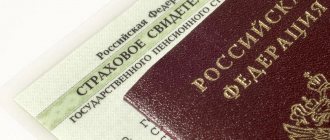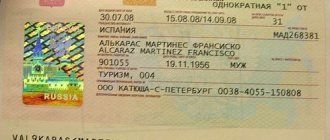Latest changes in Russian immigration legislation
The procedure for obtaining Russian citizenship is associated with the preliminary receipt of a temporary residence permit and residence permit on the basis of Federal Law No. 115. Issues of acquiring citizenship are regulated by Federal Law-62 “On Citizenship of the Russian Federation”.
On March 29, 2021, amendments to the citizenship law came into force. You can view it here. Now the President has the right to determine the categories of foreigners who can obtain Russian citizenship through a simplified procedure.
On April 24, 2021, the Presidential Decree approved a simplified procedure for obtaining citizenship for citizens of the LPR and DPR. They do not need to obtain a temporary residence permit or temporary residence permit. They can submit an application for Russian citizenship upon arrival in Russia. Also, this category of citizens is exempt from the need to renounce their existing citizenship, knowledge of the Russian language, and confirmation of their source of income.
On August 2, 2021, the President of the Russian Federation adopted Federal Law-257: https://www.kremlin.ru/acts/bank/44554. It came into force 90 days after its signing. The list of foreign citizens, including citizens of Ukraine, who can receive a temporary residence permit without a quota has been expanded. You can view the editorial by following the link.
On May 1, 2021, the President of Russia approved a new Decree. According to this document, Ukrainians and stateless persons and their children, parents and spouses who were born and lived in Crimea before 2014 can now apply for Russian citizenship under a simplified procedure: https://kremlin.ru/events/president/news/ 60429.
On July 17, 2021, Decree of the President of the Russian Federation No. 343 was issued, clarifying the list of documents required for obtaining Russian citizenship by residents of the LPR and DPR according to a simplified scheme: https://publication.pravo.gov.ru/Document/View/0001201907170036. You can view the version of the document on our website.
On April 17, 2021, Federal Law No. 134 was adopted by the State Duma and approved by the Council of Federation on amendments to Federal Law No. 62, which significantly simplifies the procedure for obtaining citizenship: https://publication.pravo.gov.ru/Document/View/0001202004240038?index=0&rangeSize= 1. Applicants no longer have to renounce their existing citizenship. The amendments entered into force on July 23, 2020.
How long do you need to live in Russia?
Without obtaining permits, a foreigner can stay in Russia for the entire period indicated on the visa. If a migrant arrived from a country with which the Russian Federation has an agreement on a visa-free regime, without obtaining a residence permit or other permitting paper, he can stay in Russia for up to 90 days. After obtaining a residence permit, how long do you have to wait to receive Russian citizenship? When a migrant obtains a residence permit, he can legally stay in the country on the basis of this document for up to five years. During this period he may:
- get a job in Russia without purchasing a patent;
- engage in private entrepreneurship;
- use the services of banking institutions, obtain loans;
- get the right to a pension;
- apply for social benefits.
Migrant children can attend kindergarten and school. After a five-year period of residence under a residence permit, a foreigner can re-submit documents for a residence permit or an application for acquisition of Russian citizenship.
Advantages of Russian citizenship over a residence permit
The relationship between a residence permit and Russian citizenship is that a residence permit is the penultimate step on the path to acquiring Russian citizenship. This is stated in Federal Law-62 “On Citizenship of the Russian Federation”.
When obtaining a temporary residence permit and temporary residence permit, it is not necessary to renounce your existing citizenship. This is necessary to obtain the official status of a Russian citizen and, perhaps, that is why many seek to obtain a residence permit in the Russian Federation. In fact, you have a document in your hands that significantly facilitates the passage of most migration formalities.
Therefore, when making such a serious decision as obtaining Russian citizenship, as an alternative to a residence permit, it is worth once again carefully weighing everything and taking into account the following:
- Having a residence permit in the Russian Federation, you acquire only economic rights (and practically no political ones).
- These rights can be equated to the rights of Russian citizens only conditionally (it will be quite difficult to use the credit products of Russian banks).
- Having a residence permit, you are required to annually confirm your stay in the country at the office of the authorized territorial body of the Ministry of Internal Affairs of Russia (this also applies to temporary residence permits). By acquiring the status of a Russian citizen, you are freed from such hassle.
- In the process of obtaining Russian citizenship, you no longer need to renounce your previous citizenship, according to Federal Law No. 134.
Residence permit in Russia
Citizenship or residence permit
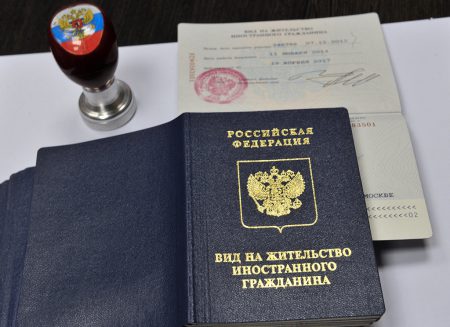
In many countries around the world, migration legislation requires that an applicant for citizenship first obtain a residence permit. This status in Russia allows a foreign citizen to legally live, get an education, and work without acquiring a patent. In addition, a residence permit allows an immigrant to enjoy social benefits. How is a residence permit different from citizenship?
Unlike the status of a Russian citizen, a residence permit does not grant voting rights to its holder. A foreign resident who is not a citizen of the Russian Federation cannot hold positions in the public service or some positions. In addition, unlike civil status, a residence permit is issued for a limited period - 5 years, but extension for the same period is possible.
Before deciding whether to obtain Russian citizenship, a foreign citizen should keep the following facts in mind:
- a residence permit gives a foreigner only economic rights;
- despite the declared right to receive a loan, banking institutions are reluctant to provide loans to foreigners with a residence permit;
- residence permit status must be confirmed annually;
- When applying for Russian citizenship, a foreigner must renounce his previous nationality.
One more nuance you should know. Despite the fact that Russia does not recognize second citizenship, the law does not provide for punishment for this.
What documents are needed for a residence permit?
A migrant can apply for a residence permit after issuing a temporary residence permit no later than six months before the expiration date of the latter. Some categories of foreigners who have the right to undergo a simplified procedure, skipping the stage of temporary residence permit, can immediately apply for a residence permit. To obtain status, you must write an application and attach the following documents to it:
- passport document of the foreign applicant;
- photo of the applicant in passport format – 2 pcs.;
- a diploma of education, a Soviet-style matriculation certificate or the result of testing for knowledge of the Russian language, the history of the state, and the laws of Russia;
- medical confirmation of the absence of infectious diseases, HIV, drug addiction;
- a receipt confirming the paid state duty.
For foreign citizens who do not enjoy benefits for obtaining Russian citizenship, it is necessary to present a temporary residence permit.
The concept of Russian citizenship
Having Russian citizenship means that a person has a strong legal connection with this state, and it is expressed mainly in the process of accepting mutual rights and obligations.
A valid passport of the Russian Federation gives a person the opportunity to enjoy all the privileges, freedoms and rights that are granted to citizens of Russia, and whose observance is protected by the state. The functions of protection and patronage of the state extend beyond the country.
The presence of freedoms and rights of a citizen of the Russian Federation provides for the fulfillment of corresponding duties, ignoring of which is punishable at the legislative level.
Is it worth getting citizenship if you have a residence permit?
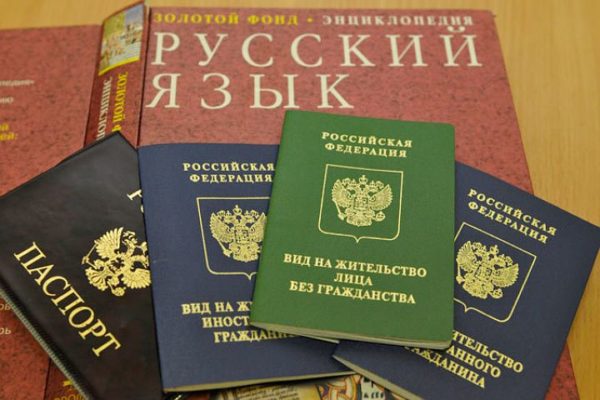
A residence permit is the last step towards obtaining the status of a citizen of the Russian Federation. If immediately upon arrival in the country a migrant receives a permit allowing temporary stay and cannot apply for a Russian passport, then after he has acquired a residence permit, he can apply for the main document - an identity card of a Russian citizen.
Of course, neither a temporary residence permit nor a residence permit imply renunciation of the citizenship of one’s own country. If it is more convenient for a migrant to have the status of a citizen of the state from which he came, then having a residence permit does not oblige him to obtain a Russian passport. It is worth listing the main advantages that a Russian citizen has, and those who only have a residence permit do not:
- enjoy not only economic, but also political rights;
- the opportunity to get a job or get a loan on more favorable terms (some organizations include Russian citizenship in the list of mandatory requirements);
- you do not need to confirm your stay in Russia and extend your residence permit.
But there is also a significant disadvantage: if a person decides to get a Russian passport, he will have to renounce the citizenship of his native country. This is not acceptable for everyone.
Methods for obtaining citizenship of the Russian Federation with a residence permit
According to the general rules, first a foreigner enters the Russian Federation with or without a visa and completes migration registration. During the period of stay in the country, he submits an application for a temporary residence permit, and then using this document he can apply for a residence permit.
As a rule, a visa is required:
- citizens of the Schengen area and many other European countries;
- people from South and North America;
- residents of Asia and Africa and various island countries.
A visa to the Russian Federation is required for citizens of those countries that have an agreement with Russia on visa procedures for crossing borders. However, there are many foreigners in the country who arrived in Russia visa-free.
There are categories of foreigners for whom it is not only possible to obtain the status of a citizen of Russia, bypassing the temporary residence permit, but even a residence permit. It all depends on the grounds for obtaining citizenship.
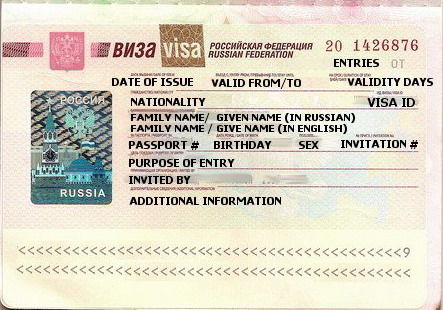
Russian visa
Who is eligible to obtain citizenship under a simplified scheme
The simplified procedure for obtaining Russian citizenship includes:
- stateless persons who had citizenship of the former USSR, who lived and are living in states that were part of the USSR, and did not receive citizenship of these states.
- were born on the territory of the RSFSR and had citizenship of the former USSR;
- have been married for at least three years to a Russian citizen living in Russia;
- are disabled and have a capable son or daughter who has reached the age of eighteen and is a citizen of the Russian Federation;
- have a child who is a citizen of Russia - if the other parent of this child, who is a citizen of Russia, has died, or has been declared missing, incompetent or limited in legal capacity, deprived of parental rights or limited in parental rights by a court decision that has entered into legal force ;
- have a son or daughter who has reached the age of eighteen years, who are citizens and by a court decision that has entered into legal force, recognized as incompetent or limited in legal capacity - if the other parent of these Russian citizens, who is a citizen of Russia, has died or by a court decision that has entered into force legal force, declared missing, incompetent or limited in legal capacity, deprived of parental rights or limited in parental rights;
- received a diploma of professional education after July 1, 2002 in Russia and have been working for at least a year, a prerequisite is the calculation of insurance contributions to the Pension Fund of Russia;
- are individual and carry out entrepreneurial activity in Russia continuously for at least three years in the types of economic activity established by the Russian Government. In this case, the amount of taxes and fees must be at least 1 million rubles;
- are investors for three years in the types of economic activities established by the Russian Government, and the amount of taxes and fees must be at least 6 million rubles;
- during the year they work in a specialty included in the List of Qualified Specialists;
- have at least one parent with Russian citizenship living in Russia;
- are citizens of the Republic of Belarus, the Republic of Kazakhstan, the Republic of Moldova or Ukraine;
- have a certificate of recognition as native speakers of the Russian language;
- a temporarily or permanently residing citizen is married to a Russian citizen living on the territory of Russia and has common children in this marriage;
- disabled foreign citizens and stateless persons who arrived in Russia before July 1, 2002 and received a temporary residence permit or residence permit in Russia;
- Resettlement Program participants;
- category of citizens determined by the President of Russia;
- veterans of the Great Patriotic War who had citizenship of the former USSR and living in the Russian Federation;
The above categories of applicants do not need to comply with the condition of a 5-year period of residence in the Russian Federation, nor do they need to confirm income.
And although the simplified procedure significantly simplifies the process of accepting Russian citizenship, in almost every case, you will need a residence permit and a previously obtained temporary residence permit.
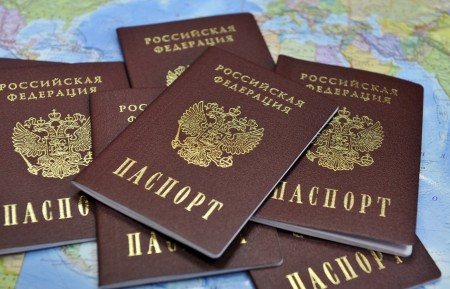
Internal passport of a citizen of the Russian Federation
Acquiring citizenship through marriage
When marrying a Russian, a foreign spouse can obtain citizenship after 3 years of married life. Of course, there are some nuances here. The wife (husband) must acquire a new marital status and also reside permanently on the territory of the Russian Federation.
If there are children in the marriage, citizenship can be obtained within a year after joining the union; a temporary residence permit in Russia is sufficient.
In general, a citizen can submit an application with a request to provide her (him) with a temporary residence permit based on a quota, and after a year receive a residence permit. But only after five years of confirmed residence in Russia has passed, this category of foreigners can count on receiving the status of a citizen of the Russian Federation.
According to a simplified scheme
In addition to the general rules for obtaining Russian citizenship, there is a simplified system for obtaining Russian citizenship. Some categories of migrants can acquire Russian citizenship using benefits. This is possible for the following foreigners:
- Those who have obtained the status of a political emigrant in the Russian Federation.
- For applicants for Russian citizenship who have received refugee status.
- If a foreigner has high achievements in any profession, he can take advantage of the benefit of obtaining Russian citizenship.
- Foreigners who have a profession or qualification that is important for the Russian Federation.
- Private entrepreneurs who have paid taxes and contributions to the Pension Fund in the Russian Federation in the amount of more than one million rubles can take advantage of the simplified procedure for obtaining civil status in Russia.
- Investors who have made financial investments in one of the sectors of the Russian economy in the amount of 10 million rubles will be granted Russian citizenship without taking into account the period of residence in Russia.
- Foreigners educated in Russia and officially employed for 3 years.
- Having parents who are Russian citizens.
- Born in the RSFSR.
- Stateless persons living in the post-Soviet space who had USSR citizenship.
- Spouses of Russian citizens who have been in a marriage union for more than 3 years.
After receiving a residence permit, how long you need to wait to obtain Russian citizenship depends on the scheme under which the foreigner applies for status. Foreigners who served under contract in the Russian army can also take advantage of citizenship benefits. From 09/01/2019, for citizens of Ukraine, the last point implies the provision of an application from an applicant for Russian civil status, certified by a notary.
Preparation of documents
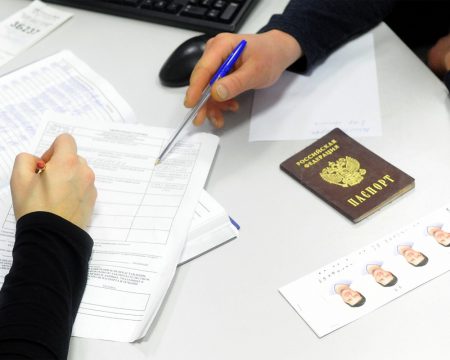
The list of documents for obtaining Russian citizenship after a residence permit for those with benefits must be supplemented with papers, depending on the grounds for registration within the simplified scheme:
- marriage document;
- diploma, confirmation of scientific degree;
- refugee document;
- birth certificate;
- identification;
- employment history;
- financial documents;
- tax return;
- others.
The period for obtaining Russian citizenship after submitting documents cannot exceed one year according to the general scheme and three months for preferential categories of applicants for Russian citizenship, if there are no comments on the set of papers. After the decision is made, the applicant for Russian citizenship is notified within a month.
An important point when registering the civil status of the Russian Federation is the preparation of such a document as an application for obtaining Russian citizenship. It must be compiled without errors; you cannot cross out or use a proofreader. The application must be written in legible handwriting or completed on a computer. The information must be true.
If, when studying the submitted application for acquisition of Russian citizenship and checking all the required documents, inconsistencies and false information are identified, the applicant will face a negative decision on granting him Russian citizenship. On what other grounds can citizenship be denied? A negative decision will be made in the following cases:
- if a candidate for Russian citizenship calls for the overthrow of the government or took part in terrorist acts;
- a security officer of another state will be denied Russian statehood;
- if the foreigner has a criminal record;
- in the case where the applicant for Russian citizenship is a defendant in a criminal case.
The period for obtaining Russian citizenship after a residence permit is generally five years. In total, if a foreigner does not have benefits for obtaining Russian civil status, then from the moment of arrival in the country, after passing all stages, citizenship can be obtained no earlier than 6 years later. According to a simplified scheme, this time period can be reduced to 6 months.
Acquiring Russian citizenship in the general manner: naturalization
Obtaining Russian citizenship in the general procedure applies to those persons for whom, accordingly, there are no simplified grounds for obtaining a temporary residence permit, residence permit, and then Russian citizenship. This process can rightfully be called the most long-term and lengthy, and this trend will most likely continue in 2021.
The procedure for acquiring Russian citizenship is generally regulated by Art. 13 Federal Law-62 https://www.consultant.ru/document/cons_doc_LAW_36927/9923b66edd0d0e15251c3040f7a17838ee536ea0/.
The difficulty of accepting citizenship in the general manner is that by the time the application is submitted, the applicant must have lived in the country under a residence permit for about 5 years.
The decision to grant the status of a citizen of the Russian Federation is made directly by the President of the Russian Federation (while persons receiving Russian citizenship in a simplified manner only need to contact the authorized territorial body of the Ministry of Internal Affairs of Russia) within a year from the moment the foreigner’s application and accompanying documents are accepted.
As part of naturalization, the following requirements must also be observed:
- Reside continuously in the Russian Federation with a residence permit for 5 years.
- Strictly adhere to your promise to comply with the articles of the Constitution of the Russian Federation, as well as other legislative acts relevant for 2021.
- Have legitimate financial sources to support yourself and your family.
- Be fluent in Russian and have documented evidence to prove it.
According to the amendments to Federal Law No. 134, there is no need to renounce previous citizenship either in general or in a simplified manner.
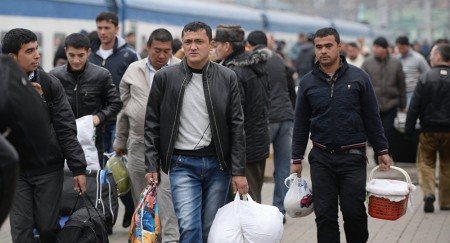
Foreigners in the Russian Federation
Documents for obtaining Russian citizenship
A foreign citizen is required to attach a certain set of documents to the application, since incorrectly completed documentation or its absence may cause the application to be rejected.
Original documents are always submitted. Already on the spot, officials make copies of them, and the originals are returned to the owner. Documents submitted in a foreign language must be translated and notarized. Sometimes an apostille may be required.
The citizenship package includes:
- Application completed in 2 copies. The application form for obtaining Russian citizenship and a sample of filling out the application can be downloaded here.
- Valid residence permit.
- 3 photos (35x45 mm).
- Documents indicating a change in last name, first name or patronymic.
- A receipt confirming payment of the state duty (for 2021 - 3,500 rubles).
- Foreigner's passport (or stateless person's identity card).
Since 2021, residents of the LPR and DPR are exempt from paying state duty.
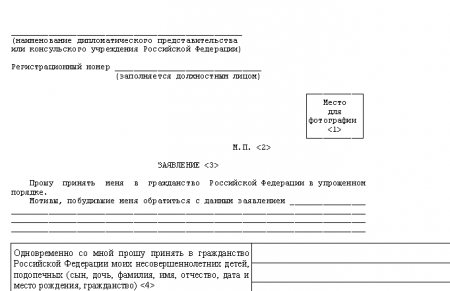
Example of an application for Russian citizenship
Nuances of obtaining citizenship
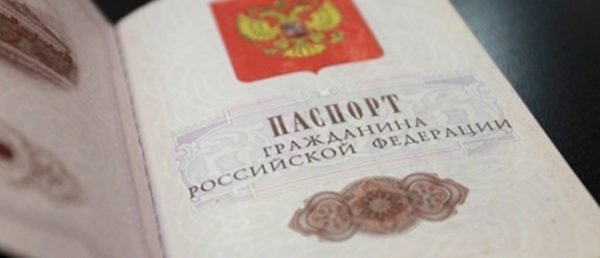
In addition to having a residence permit, all the necessary documents, as well as residence in Russia for more than 5 years, a person applying for a passport of a citizen of the Russian Federation must also meet the following criteria:
- comply with Russian legislation, that is, not commit offenses;
- have a legal source of income that allows him to provide for himself and all loved ones under his care;
- speak Russian fluently;
- send a notification to his home country that he becomes a citizen of the Russian Federation and renounces the citizenship of this state.
The last point, however, is not always strictly observed in practice. Since Russian legislation does not imply any responsibility for dual citizenship, many people keep a second passport. But it is worth considering that the government of another country may have different views on this situation and punish the binational to the fullest extent of its laws.
We also read: Notification of confirmation of residence in the Russian Federation under temporary residence permit
Deadlines
The period for the President of Russia to make a decision on granting you citizenship and the opportunity to obtain a Russian passport is one year (in a simplified manner, from 3 to 6 months). During this time, the authorities verify the authenticity of the application. That is, whether a visa to enter the territory of the Russian Federation was obtained without violations, whether the temporary residence permit and residence permit were correctly issued, and so on.
In a situation where a decision has been made to grant Russian citizenship, the applicant must be informed within 1 month. from the moment:
- a decision taken by authorized bodies to admit a foreigner to Russian citizenship in a simplified manner;
- issuing a presidential decree on the admission of a foreigner to Russian citizenship.
Information about this is sent to the foreign citizen by mail to the registration address. Therefore, it is appropriate to talk about increasing the period for obtaining citizenship by a general rule of 13 months.
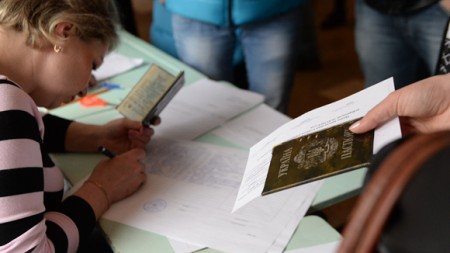
Filling out an application for citizenship
After receiving the notification, you can contact the Main Department of Migration of the Ministry of Internal Affairs to obtain an internal passport of a citizen of the Russian Federation (remember, it is received by persons who are already 14 years old). The processing time is regulated by Russian passport rules, but rarely exceeds ten days.
All deadlines are maximum. Increasing the time it takes for employees to make decisions is a violation of the current legislation on citizenship.

